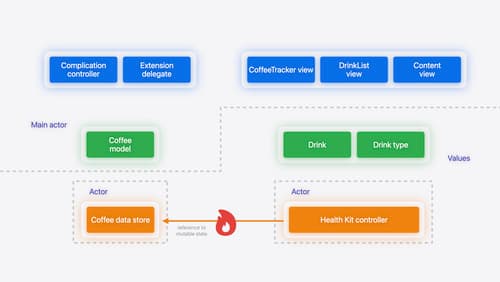When to use actors
Asked on 2024-08-02
1 search
Actors in Swift are used to manage shared mutable state in a concurrent environment safely. They are similar to classes but provide automatic protection by serializing access to their state, ensuring that only one task can execute at a time on an actor. This helps prevent data races and makes concurrent programming more manageable.
Here are some specific scenarios where you might use actors:
-
Encapsulating Shared Mutable State: When you have a piece of state that is accessed and modified by multiple tasks, using an actor can help ensure that these accesses are serialized, preventing data races. For example, in the session A Swift Tour: Explore Swift’s features and design, the
userstoreis made an actor to synchronize concurrent accesses. -
Main Actor for UI Updates: When dealing with UI updates, you often need to ensure that these updates happen on the main thread. Swift provides the
main actorfor this purpose. For instance, in the session Migrate your app to Swift 6, themain actoris used to guarantee that certain methods are called on the main thread. -
Background Operations: When performing background operations that need to communicate with the main thread or other actors, you can use dedicated actors for these tasks. This is discussed in the session Migrate your app to Swift 6, where background operations are performed on dedicated actors, and they communicate using thread-safe value types.
-
Preventing Data Races: Actors help in preventing data races by ensuring that shared mutable state is not accessed simultaneously by multiple tasks. This is highlighted in the session Migrate your app to Swift 6, where the benefits of Swift 6's full enforcement of data isolation are discussed.
In summary, actors are a powerful feature in Swift for managing concurrency and ensuring data safety in your applications. They are particularly useful for encapsulating shared mutable state, ensuring UI updates happen on the main thread, performing background operations, and preventing data races.

A Swift Tour: Explore Swift’s features and design
Learn the essential features and design philosophy of the Swift programming language. We’ll explore how to model data, handle errors, use protocols, write concurrent code, and more while building up a Swift package that has a library, an HTTP server, and a command line client. Whether you’re just beginning your Swift journey or have been with us from the start, this talk will help you get the most out of the language.

Compose interactive 3D content in Reality Composer Pro
Discover how the Timeline view in Reality Composer Pro can bring your 3D content to life. Learn how to create an animated story in which characters and objects interact with each other and the world around them using inverse kinematics, blend shapes, and skeletal poses. We’ll also show you how to use built-in and custom actions, sequence your actions, apply triggers, and implement natural movements.

Migrate your app to Swift 6
Experience Swift 6 migration in action as we update an existing sample app. Learn how to migrate incrementally, module by module, and how the compiler helps you identify code that’s at risk of data races. Discover different techniques for ensuring clear isolation boundaries and eliminating concurrent access to shared mutable state.
